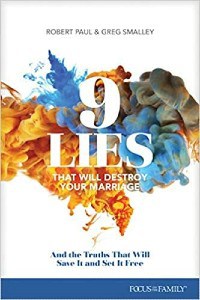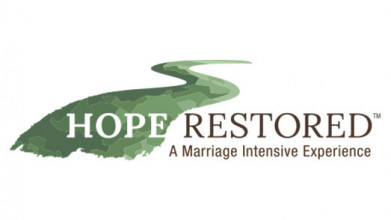
The War of Words
In this Adventures in Odyssey drama, a carelessly uttered word from Eugene creates havoc as it becomes the fashionable insult, resulting in a lesson about the power of words.
Home » Episodes » Focus on the Family Broadcast » Loving the Story of Your Marriage (Part 1 of 2)
DRAMATIC TEASER
SFX: police siren
Driver: What? Oh man!
Cop: May I see your license please?
Driver: (sigh) What’s all this about officer? I wasn’t speeding. My tags and license are all up to date. Hey — why are you writing me a ticket?
Cop: Oh, this isn’t a ticket. It’s just a warning. You’ve been neglecting your marriage, Mr. Smith. And if you’re not careful, you could be facing serious trouble down the road.
Driver: My marriage? Trouble? What are talking about?
Cop: Like I said, this is just a warning Mr. Smith. Spend more time with your wife. Be sensitive to her feelings. Don’t forget about those relationships which are most important to you. And safe driving, too.
John Fuller: Well, would your marriage benefit from a friendly little reminder like that? Uh, today on Focus on the Family, we have something like that for you, as, uh, we explore the relationship with your spouse, how you can make that better and really experience the intimacy and, uh, the love that God intends for you both. I’m John Fuller, and your host is Focus on the Family president and author, Jim Daly.
Jim Daly: Uh, John, I think we all need encouragement about marriage and positive reminders about marriage. We dwell on the negative so often, you know, the differences rather than those things that God used to bring us together. And like you said, uh, making that relationship a priority. I, I don’t know why it’s so hard. We have a lot of things that pull at us in this life, but the core thing is going to be your family, and that’s we’re here at Focus (laughs) on the Family to try to make your family the strongest it can be.
Jim: Um, if we’re honest, it’s easy to slip into the routines of life, and taking care of the kids, pursuing careers, managing the household, all of it. Uh, sometimes our marriages, they just end up getting the short end of the stick. And you can rationalize it, you can give a lot of excuses for it, but I’m telling you, it’s the most important thing in this world that you can concentrate on. Um, of course, your relationship with Christ is the foundation, but marriage is right next to it, and it’s going to be the thing that carries you through in this life.
Jim: Uh, every marriage has its ebbs and flows. We get that times tha- where you feel connected, other times when you’re feeling distant. That’s actually normal.
John: Mm-hmm.
Jim: Don’t panic. But what we’re talking about today and going to talk about with our guests is that sense of, uh, distance that can occur and then what you need to do to close that gap and fall in love again and, uh, remember the key things that God pulled you together to accomplish.
John: Yeah. I- if you’re feeling a little bit complacent about your relationship, I think you’ll find this to be a good, encouraging program. Uh, Jim, we won’t be addressing those couples who are in serious trouble. We have, uh, resources for folks, uh, in that kind of trouble, uh, and we’d invite you to give us a call. But we really do want to make this a, kind of a fine tune-up time.
Jim: E- that’s exactly right, John. Brad and Marilyn Rhoads are the co-founders of Grace Marriage. I just like that. It sounds right. You got to have a lot of grace in marriage. Uh, but this is a church-based ministry that is working to equip local churches to strengthen marriages each and every day. The Rhoads have a passion to help other couples experience the kind of transformational changes they’ve seen in their own marriage, and that’s where we’re going to talk with them today. So welcome both of you to Focus on the Family.
Brad Rhoads: Thank you.
Marilyn Rhoads: Thank you.
Brad: Glad to be here.
Jim: Uh, so let’s get right to it. Uh, let’s start with that overview of marriage today. Is marriage more difficult today than it was 50 years ago?
Brad: I think so.
Jim: Why?
Brad: There’s so much noise. You have cell phones, you have-
Jim: (laughs) Yeah, that’s true.
Brad: You have youth sports. You have Travel Ball. You have so many things that it’s so much more difficult now, I think, to make space for the marriage because so many things compete for time. And then in Matthew it talks about the worries of the world and the deceitfulness of wealth choking out the Word.
Jim: Mm-hmm.
Brad: I think the busyness and trying to pay bills and all that goes on squeezes out the life of the marriage.
Jim: Yeah. How about you, Marilyn, as a woman and a wife, uh, when you look at the role of marriage in the culture today, is it harder when you talk to your girlfriends? Is it different than maybe what your mother and grandmother may have talked about or is it generally the same?
Marilyn: Absolutely. I think it’s… I think it’s more difficult… I think since we’ve shifted into a child-centered mentality, where everything revolves around the children, and like he said, when we were growing up there was no such thing as Travel Ball. But now-
Jim: Yeah.
Marilyn: unless you’re playing Travel Ball, you’re not going to be playing sports.
Jim: Yeah.
Marilyn: It’s just the intensity. And then all of the media that we have before us. You hear… when we work with couples now, one of the things we hear most is that that is such a, a moot poi-… that’s an issue for them, struggling to keep that at bay.
Jim: Yeah.
Marilyn: To keep… to turn off the noise so we do focus on each other. I think it makes it-
Jim: It’s so hard to do. Uh, you know, one of the things, we have one of our sons that was very interested in baseball, and we didn’t really get on that bandwagon. Um, you know, we… not intentionally, but it just worked out to where we didn’t have a lot of energy about doing, you know, a travel team like that. The money was expensive.
Marilyn: Mm-hmm.
Jim: And then you’re on the road almost every weekend, uh, going somewhere regionally. Sometimes it’s two states over. And, I mean, it just… it does consume a lot of time. And, uh, unless you’re really thinking this kid’s got pro ball potential, uh, it’s probably a difficult decision.
Marilyn: Yes.
Brad: It is. A friend of mine said I’ve decided I’m not going to sacrifice my entire family in hopes my child will be an average high school soccer player.
Jim: (laughs)
John: (laughs)
Brad: (laughs)
Jim: That’s a good way to look at it. But it’s so true. Um, y- y- you mentioned that aspect in the marriage where, you know, all these things kind of pull us apart. How did you recognize you had a problem, and then how did you kind of formulate some solutions to getting back to what was healthy?
Marilyn: I think it goes all the way back to when we were first married. We brought into marriage what the world feeds us. I mean, I loved romance movies and learning about Prince Charming, and I had these expectations that were off the charts. So we come into marriage with me with these expectations that he’s-
Jim: Can you describe those, just to help the listeners? What do those expectations look like?
Marilyn: Well, um, I thought that we would get up every morning and have coffee together and talk about our day, and he’s the type that got up two minutes before he had to be out the door and heading off to… you know, we moved to a new town when we got married. So we were in a new town, newly married, didn’t know anyone. He was starting a law practice, and it really was a recipe for just a tank.
Jim: Yeah.
Marilyn: Uh, and so we had a really difficult first year in that I came with these expectations. I thought we would, in the afternoons after work, go for runs together, play tennis together, and just spend all of this time together. And it j-… did not look like that.
Jim: Yeah.
Marilyn: And so I spent a lot of time really… I was also in graduate school in social work. So I was getting this degree, and I’m learning all these theories and thinking that, um, I need to tell him these things. If I don’t tell him all the things he’s doing that bother me-
Jim: (laughs)
Marilyn: then we’re going set these unhealthy patterns for our marriage. So about once a week I would just cry, and he would be, like, “Oh no, here we go again.” Because I think he came at marriage with no expectations.
Jim: Right. (laughs)
Marilyn: So you have this, this, this collision. And so we had-
Jim: Is this about like a year into your marriage-
Marilyn: This was-
Jim: or months, or…
Marilyn: Oh, this… the honeymoon was over before the honeymoon was, (laughs)-
Jim: Oh. (laughs)
Marilyn: was over. It… We-
Jim: Right.
Marilyn: We knew we-
Jim: So you saw right away.
Marilyn: We did see right away. And then we really did struggle that first year. And I was telling him everything he was doing that bothered me and just being a nag and doing everything wrong. And at one point the Lord really spoke to my heart and was like, “I’m your hope. Not Brad.”
Jim: Huh.
Marilyn: And I felt so convicted that I had put him in the place of God. And often, I think the enemy does that. The good gifts God gives us, then we use it to take our eyes off of our true-
Jim: Mm-hmm.
Marilyn: hope, which is Christ.
Jim: Yeah.
Marilyn: And He’s the lover of my soul.
Marilyn: So I went to Brad, and I said, “Will you forgive me? I’ve put you in the-
Jim: Wow.
Marilyn: place of God. And that… there’s no way you can meet that expectation. And so, I’m sorry. And, um, I don’t, um, need you to have joy. My hope is in Christ, and that’s where my joy is.” And that was really a turning point for me and my relationship with the Lord.
Jim: Yeah.
Marilyn: And then also in our relationship because we then went from really miserable to stable.
Jim: Hmm. So you got out of the pit and at least got to ground level.
Marilyn: Got to ground level.
Jim: But Marilyn, I so appreciate that vulnerability and that openness. I, I can think of people I know, couples I know, that they may have been married 15, 20, 30, and, and she hasn’t come to that understanding, that he’s not going to meet all my needs.
Marilyn: That’s right.
Jim: What advice do you have for that person, 10, 20, 30 years into their marriage, and they’re still nagging and complaining that you’re not… you’re not there, boy. You, you have missed the bar.
Marilyn: Yes.
Jim: And you continue to miss the bar. And all he’s hearing is, “Yah, yah, yah.” And they’ve lived like that for years now. Uh, speak to her directly. Say, “Hey, here’s what’s going to help you most.”
Marilyn: That’s-
Jim: Not nagging.
Marilyn: That’s what got us involved in Grace Marriage. We felt so convicted about how it’s approached so poorly, and we see it so much in young couples, and that’s how we first started out doing premarital counseling and then marriage groups in our home. And I would… I just… I share that with any women that I talk to that your husband is not your hope, Christ is. And if your hope is in Christ, then you take that burden off them and free them from what you’re laying on them. And when you have that, then anything good within your marriage is a gift straight from God and blessings-
Jim: Yeah.
Marilyn: that just, you know, encourage and help each other. But he does not complete you. I mean, the world will tell us that your spouse completes you. We complement each other, but we certainly don’t-
Jim: And I- it’s so important. But w- w-… man, we are into it already.
John: Mm-hmm.
Jim: This is deep stuff, and I so appreciate it. The, the key here, though, I really want woman to catch what you’re saying, Marilyn. Because this, in my mind, this is where you are going to get the most hope and help-
Marilyn: Mm-hmm.
Jim: is coming to this realization that he’s not going to be able to meet all your needs. He’s an imperfect person.
Marilyn: That’s right.
Jim: And you’ve got to somehow settle in your heart that that’s okay.
Marilyn: Mm-hmm.
Jim: And I think so many married women, um, struggle resting in that.
Marilyn: Mm-hmm.
Jim: And so, did you continue to struggle, even though you knew it. The Lord had pierced your heart with that, you know, very direct sense, “Hey, Marilyn, your hopes in me, not in Brad.” That’s pretty direct.
Marilyn: It was.
Jim: Did you still stumble with it? Did you still struggle with it? Were there times you began to recognize, “Okay, whoa. I’m going back to that old person. I don’t want to do that.”
Marilyn: Sure, yesterday. (laughs)
Jim: (laughs)
John: (laughs)
Brad: (laughs)
Jim: No, that’s good. No, that’s good.
Marilyn: It’s true.
Jim: Yeah.
Marilyn: It is when I find myself being bothered by something that Brad’s doing or not doing that I wish he wouldn’t do, which is going to be us through life. I’m reminded, “Whoa, where’s your hope?”
Jim: Right.
Marilyn: “It’s in Me.” So it’s a check.
Jim: Yeah.
Marilyn: Each time we come to those places. Sure there are things we talk and work through and share when we’re struggling, but, but at the core, if it’s hitting me at a place that’s that deep, then I’ve taken my eyes off Christ.
Jim: Do you think, and Brad, you’re going to get in here, believe me, but I just love this. Marilyn, you’re so open about it. And I, I just appreciate that so much. I– for that woman who struggles in that area, um, what is a practical, day-to-day thing that they can do? I mean, you, you… it sounds like you have developed some great positive triggers-
Marilyn: Mm-hmm.
Jim: to catch yourself. So, educate us.
Marilyn: One thing I do, and I’ll tell women in our Bible study groups is if your husband does something that bothers you, don’t immediately share it with him. Pray on it. Pray on it, pray on it, and pray on it.
Jim: That is so hard-
Marilyn: It is so hard.
Jim: (laughs) to bite your tongue.
Marilyn: It is, and I don’t do it every time. Don’t hear me… because I don’t do it all of the time, but my prayer is by the Holy Spirit’s leading when I’m spending time with the Lord, and that I will pause, and I will pray about it before I take it to him. We talk-
Jim: What’s the benefit? What’s the benefit of doing it that way?
Marilyn: Oh, I’m trusting him for the result, not myself. You know, and that… Even in The Power of a Praying Wife she talks about the Holy Spirit does such a better job at working on our spouses than we do. We often get in the way of the Holy Spirit’s moving when we take matters into our own hands. But when we pray, we give God room to work, rather than-
Jim: I-
Marilyn: make bigger messes.
Jim: I love it. Th- that is so good. Now Brad, we’re going to just, you know, pick on you now.
Brad: (laughs)
Jim: So you have… I can’t believe you had no expectations in your marriage.
Marilyn: (laughs)
Jim: I mean that just sounds a little gentle coming from Marilyn. But you had to have some expectations.
Brad: I can’t really say I thought about it.
Jim: Okay. (laughs)
John: Oh.
Marilyn: (laughs)
Brad: I mean I can’t say I had, uh… I don’t know that I had any expectations. It’s probably just what I… I had two professional parents that both worked really hard and were loyal and-
Jim: Right.
Brad: and kind of let-
John: Very calm.
Brad: just kind of let each other do their own thing.
Jim: Yeah, interesting.
Brad: And di- did it really well. And had a stable marriage and wonderful people, it was just a different model than Marilyn came in with an expectation of.
Jim: Sure. So you were an attorney for 20 years. Describe that environment, as Marilyn described it a moment ago, you’d get up just in time to get ready for work and go out the door and conquer the day and win a case and counsel people on what to do to probably save money, save their marriages, whatever, and then come home and be a little bit exhausted. What, what did that look like for you?
Brad: We left Nashville, I worked at a big firm in Nashville, to start a practice in Owensboro, and I was really excited. So I was just fired up about building a law practice, and I took all my eyes off the Lord and off Marilyn and on to building a law practice. Tons of creative thought of ideas to generate clients, and I didn’t put any creative thought at all on how to nurture my wife.
Jim: And what were the… what were the danger signs for you?
Brad: I didn’t see that I had a problem. I thought that I had a hypersensitive wife. I felt that everybody else liked me fine, what’s her problem? Staff seems to like me; clients seem to like me-
Jim: So I’ve got it together.
Brad: then I come home-
John: And she’s crying.
Brad: and she doesn’t… and she doesn’t like me. So it’s-
Marilyn: (laughs)
Brad: you know, it made sense to me. But like a friend of mine once said, he said, “The person that knows you the best likes you the least. That’s probably a problem with you.”
Jim: Boy.
Brad: But I had a, a- an uncle who has mentored me and he could see what I couldn’t see, and he was not going to leave me alone until it was different. And it was back in the early end of Promise Keepers, and I had trouble sitting for an hour at church, I was thinking eight hours of marriage preaching would drive me crazy.
Jim: (laughs)
Brad: So I turned him down two or three times.
John: Right.
Brad: Uh, then he called my staff, cleared my schedule. He called my wife, cleared my schedule. Bought my ticket, invited my father-in-law, and called and said, “Brad, I’ve got great news for you. You’re free, and you’re going.” And I didn’t want to go, but God didn’t care. And I learned that His Word’s sharper than a double-edged sword.
Jim: Yeah. I mean ha- ha-… You weren’t angry? How did you respond to him?
Brad: Now
Jim: I know he’s your uncle, but still. What are you doing, Uncle Bob?
Brad: (laughs) Tom loves me-
Jim: Uh, Tom. Okay.
Brad: and I love Tom, and so I knew he had my best interest in heart, I just think he didn’t fully get it. But when I… when I got there, I mean, literally, the Lord shattered me, I mean shattered me.
Jim: Yeah. And it worked. And, you know, again, what a blessing that it happened so early in your marriage. Did you have discussions like that when, when you would come home, Brad, and Marilyn, uh, you know, both of you can answer this. But did, did you, um, articulate that observation to Marilyn saying, “You know, I seem to be healthy. I’m in a good place. People like me. Why don’t you like me? What’s your problem?”
Brad: I didn’t. I don’t know. I’ll let you answer that, Marilyn. I don’t recall articulating it. I just pretty much went about my life.
Jim: Yeah.
Marilyn: Well, you would sometimes say, “You just need to take a chill pill.” (laughs)
Jim: (laughs) To you, right?
Marilyn: Yes.
Jim: Many husbands have said that to their wives.
Brad: (laughs)
Marilyn: (laughs) But, but he didn’t articulate it that way. But you could tell, you pick up on how people are feeling.
John: Uh, Brad, a moment ago, you mentioned going to a Promise Keeper’s event, and there are some who won’t know what those are. So where was that, and, and what happened that, as… I, I think you said, shattered you? What, what, what exactly took place?
Brad: It was in Memphis, Tennessee. Probably about 50 thousand men there, and it was just expositing the scripture on marriage. It said, “Love your wife just as Christ loved the church and gave his life up for her. Brad, what do you give up for Marilyn?” I sat there and nothing. Live with your wife in understanding way. Do you ask her questions? Do you seek to understand her? Do you spend time just relating with her? No. Don’t be harsh with her. I was sarcastic. All of her tears made sense. My sin was HD clear. I remember having the vivid thought, “Am I doing anything correctly?” Uh, and, and the answer was, no. But God gave me a Godly sorrow. Out of Second Corinthians it says, you know, a Godly sorrow leads you to zeal to clear oneself, and I could not wait to get home.
John: So, what was the drive like back home?
Brad: I couldn’t wait. I couldn’t wait to get back home. I remember thinking, “She’s still there. She’s still there. And we’re going to make this right.” Yeah, and we got home at 2 A.M. from that event. At 5:30 A.M. before church, she’s up planting plants. And I got up at 5:30 on 3 1/2 hours of sleep with a shovel and I said, “Where do you want me to dig?” And she looked at me like I was a ghost.
Jim: (laughs)
Brad: Like, “What are you doing?” I said, “Honey, we’re starting the day.” And it was weird because I knew something had changed. I wasn’t worried about being temporary. I remember hoping she wouldn’t believe me just so… because I thought five years from now, she’ll have no question. I didn’t feel like I needed to prove myself. I feel like God had just changed me. And our marriage underwent a transformation. We went from probably the normal, coexistent marriage where you just go through life side by side together to just richly enjoying each other and richly enjoying marriage. And that really is what God used to, to vault us into marriage ministry. Because of the kids we did the youth ministry, and we want what you guys have, will you do our premarital? So that was the gateway into marriage ministry, probably 12 years ago.
Jim: And in that context, um, where are we getting it wrong? Uh, as churches do marriage ministry, what- what’s working with what you’re doing and what would you say to the pastors who are listening?
Brad: Two things. One, we teach… to have a great marriage you have to not need one. The Lord Jesus Christ is sufficient. I don’t need Marilyn to feel respected. She doesn’t need me to make her feel special. Jesus Christ adopted us. We’re His kids, and that’s sufficient, it’s enough. So we’re asking of marriage, one, things that marriage can’t give us. And then we fight and fight and fight to get it to give us something it can never give us. That’s one thing. The other is, we’ve seen a growing intentionality. One of my board members said, “Couples will never be more intentional with their marriages than churches are with their marriage ministries.” And as we’ve met with churches, the level of intentionality with children and youth compared to marriage, it’s a big difference.
Jim: Huh, interesting.
Brad: There’s a big gap. There’s a pretty strong focus on premarital counseling, pretty strong focus on crisis help, but not a lot of good structures to help the everyday marriage grow and be protected.
Jim: Right.
Brad: So what we want churches to do, and what they’re doing, we’re so excited, is they’re going up stream, catching marriages pre-crisis. If you catch a marriage at a 5, it’s not hard to get it to an 8 or 9.
Jim: Mm-hmm.
Brad: But you catch a marriage at a 1, it takes real expertise to try to help them get to a 3 because-
Jim: Yeah.
Brad: of the damage that’s been done by the time they hit that crisis point.
Jim: Yeah. No, that’s really well said. Uh, I want to make sure we’re catching the heart of the listener who may be struggling. And so Marilyn, coming back to you. You made a comment that, um, I think is really interesting. You said you were great, talking to Brad, you were great at dating but horrible at marriage. I think a lot of wives have… I think I recall Jean making that statement to me a few years ago, you know. I, I love you. I just don’t like you right now.
Brad: Mm-hmm.
Jim: I mean, there’s lots of ways that that statement comes out. And it, it all comes back to the same source, what you’re describing, Brad, our neglect as husbands toward our wives. Um, speak to that moment. What were you expressing to Brad to say something like that, you know, you’re good at dating, but you’re horrible at marriage?
Marilyn: I wanted him to start treating me as he did when we dated. Because I feel like when we were dating it was this courtship and this pursuit, but then once we were married, it kind of… we’re married now, so that can stop.
Jim: Right.
Marilyn: Where I still wanted some of this to go on. And that’s why I would say that because at that point he was pursuing building a practice, put his focus on that.
Jim: It really-
Marilyn: I don’t know if that makes sense.
Jim: No, that’s good. It sounds like, you know, and, and it happens to us men, that our vocational interests become our mistress, and we ignore our, our wife. And we justify it by saying, “Look how we’re helping the family. My job’s to provide, and, you know, this is what I’m doing. And you should be actually patting me on the back because I’m doing a pretty good job providing for us.”
Marilyn: Mm-hmm.
Jim: And you’re going, “But I’m starving. I’m dying-
Marilyn: Yes.
Jim: and that’s not what I’m interested in.”
Marilyn: That’s right.
Jim: Uh, just describe that for us.
Marilyn: Well, it came out in tears about weekly, and I would just… I would say things like, “If you loved me, then you would spend time with me, or we’d get up and we would have coffee together or we would do things together.” And, and he would say, “I do love you.” And so by that I was just expressing my frustration in that the way I feel loved is by an action. And, and he would sit there and roll his eyes. And I, I was actually accomplishing the opposite of what I was wanting to accomplish.
Jim: Huh, mm-hmm.
Marilyn: And so when God really spoke to my heart and was like, “I’m your hope. Not Brad.” Then I, I really was free to just give rather than beg for him what I wanted.
Jim: Yeah, give-
John: Hmm.
Jim: without expectation.
Marilyn: Yes. Yes.
Jim: Wow.
Marilyn: So, I kind of, and I’ve said before to women, you just need to bury the bar.
Jim: Hmm.
Marilyn: You know, not just… Bury the bar of expectations because that, e-… um, when I put expectations on him, it actually… it sets us up for trouble. But if I don’t have expectations, and I freely give love to him, then it… you just… even in that place, once I went to him, our marriage went to a better place before he went to Promise Keepers. So I went to him, and I said I was sorry, and I’ve put expectations on you, and I really was pursuing the Lord. And then just listening to the Lord, like, “How can I love him? How can I love him well?” And we started doing better without me telling him, “You’re doing this wrong. You’re doing this wrong. You’re doing this wrong,” because I shifted from a mentality which I think is so easy that the world falls into… we all fall into that, what you can do for me-
Jim: Right.
Marilyn: and that’s the greatest reason marriages are just crash and burn.
Jim: Yeah. No, so the Lord is working in both of you kind of simultaneously, it sounds like. Um, and then Brad, you get back from Promise Keepers, this big change. You show up in the garden 5:30 in the morning, three hours after you put your head on your pillow.
Brad: Hmm.
Jim: And it begins to change. So wh- what were some of the evidences of this occurring. Um, being there is obviously one. O- over the next week, two weeks, months, couple of years, w- w- was it sustainable?
Brad: Yes. Um, I started putting creative thought in how to bless and love Marilyn and not just creative thought in how to grow a law practice and handle cases well. I started using creative energy into my wife and family, which was most important, and not just toward my law practice. And it was sustainable. We’ve been through really difficult times in our family, where she’s really sad, I’m really down, I’m really anxious. But we’ve… spending time together, appreciating one another, that has been stable and constant.
Jim: Oh, that is so good. What are some of the examples there where you’ve seen success through Grace Marriage?
Brad: What we’ve seen is, we provide a structure that all couples can get in. Because I found that sustained growth is rare without structure and accountability. I’d been in entrepreneurial business coaching for six years, so every 90 days I would go to… I would go to business coaching, and they would tell me what to do next, and if I didn’t do it, they remind me. And I realized that structure is why our business grew so well. But why wouldn’t that stra-… same structure work in marriages?
Jim: Hmm.
Brad: So we worked on that structure from 2012 until leaving the practice in 2015, and now what we’ve seen, when couples invest in their marriage. That scripture that says whoever sows generously will reap generously. We hear it over and over and over, the difference it makes when people invest time, resources, and creative energy into their marriage, they’re amazed what a great gig the Lord’s given them in their spouse.
John: Hmm.
Jim: That is so well said. Um, it’s great that you’re using the lessons you learned in the early years of your marriage to help other couples today. Now, I want to hear a lot more about Grace Marriage next time. Let me turn to our listeners for a moment to remind you of all the great tools we have here at Focus on the Family for your benefit. We want to help husbands and wives thrive in their marriages, and that’s why we’re talking about the topic today. If you need prayer or encouragement or just someone to talk to, we have a wonderful team of Christian counselors who can help. And we have lots of resources at our website, like Hope Restored where we provide several days of intensive counseling for those couples who are ready to call it quits. But after they go through Hope Restored, 80% of the couples surveyed two years later are still married, and that is an amazing statistic. So we’re here to help you discover God’s best for your marriage.
John: And we’ll put you in touch with our counseling team or- any of the other resources that Jim just mentioned, and, uh, we can do that when you call 800-232-6459, 800, the letter A, and the word, FAMILY, or visit focusonthefamily.com/broadcast to learn more.
Jim: And let me give you a tangible takeaway from what we’ve shared today. Um, two of our colleagues, Dr.’s Greg Smalley and Bob Paul have written an excellent book called the DNA of Relationships for Couples where they examine common struggles in marriages, uh, everything from a work/family balance to dealing with serious issues like infidelity. Now, I know you’re going to find this book to be a valuable tool for your marriage, and I’d like to give you a copy today when you send a financial gift of any amount to Focus on The Family. And that’s our way of saying thanks for helping us uphold and strengthen marriages throughout the country. If you can’t afford it, uh, get in touch with us. We’ll find a way to get it into your hands. Uh, Brad and Marilyn, there are many more questions that I want to ask you about, and, um, you have a wonderful story about a six-month road trip that you took with all five of your kids. I, I can’t wait to hear how wonderful it was. A- as a fellow camper, I’m thinking there’s some pretty incredible stories ahead. So, let’s, uh… come back next time, and we’ll talk about what the Lord accomplished in that mess, (laughs) kind of rekindling your marriage and your family in that experience. Can we do that?
Brad: Absolutely.
Marilyn: Mm-hmm.
John: All right. And we’re looking forward to having you, as a listener, join us next time for the continuation of this conversation with the Rhoads. Meanwhile, donate to Focus on The Family and receive your copy of the book by Dr.’s Smalley and Paul. It’s all at focusonthefamily.com/broadcast or call 1-800, the letter A, and the word family, 800-232-6459. Coming up tomorrow, how you can transform your relationship with your spouse.
Preview:
Brad: Statistics shows a 40% to 50% chance your marriage will end, but they also show if you’ll invest, and you’ll spend time, and you’ll do things with your spouse, and you’ll engage with her 90 days in coaching together, it’s likely never to happen.
End of Preview

A graduate of the University of Kentucky College of Law, Brad Rhoads practiced as a full-time attorney for more than 20 years, and he has served as the lay pastor of marriage at his church since 2010. His wife, Marilyn, holds degrees in psychology and social work, and counseled at Counseling Associates before leaving the practice to be home with her children. Together, Brad and Marilyn are the co-founders of Grace Marriage, which is dedicated to assisting local churches to change marriage in our churches and the culture at large. The couple leads marriage retreats, authors marriage wellness materials, provides leadership training, and leads quarterly marriage groups. Brad and Marilyn have five children. Learn more about the Rhoads and their ministry at gracemarriage.com.

Receive the book 9 Lies That Will Destroy Your Marriage for your donation of any amount!

The Focus on the Family Marriage Assessment is designed to evaluate the strength of 12 essential traits of your marriage. Do you know your marriage's strengths and weaknesses?

URGENT: Please ask your U.S. Senators to vote NO on H.R. 8404, a bill seeking to redefine marriage. Click the link for details.

For couples in crisis, you can still put the pieces of your marriage back together with Hope Restored.

Visit our online store and purchase a CD of today's program for yourself or to share with a friend.

Two ways to overcome negatives in the relationship with your spouse.

This article illustrates how an attitude of grace reminds you to believe the best about your spouse.

Sometimes it helps to reflect on the funny moments or bloopers in our relationships with one another.

How to better resolve conflict in your so your relationship can thrive.

Spiritual unity with your spouse can strengthen your marriage and be a witness for God’s love.

This video describes how investing in your marriage can transform the relationship with your spouse

In this Adventures in Odyssey drama, a carelessly uttered word from Eugene creates havoc as it becomes the fashionable insult, resulting in a lesson about the power of words.

This discussion offers a preview of Volume #16 “Cultures in Conflict” from the That The World May Know video series, available below.

Debra Fileta will help couples better understand the four seasons of healthy relationships, what to expect during each one, and how to carefully navigate them for a stronger marriage. (Part 1 of 2)

Larnelle Harris shares stories about how God redeemed the dysfunctional past of his parents, the many African-American teachers who sacrificed their time and energy to give young men like himself a better future, and how his faithfulness to godly principles gave him greater opportunities and career success than anything else.

Amy Carroll shares how her perfectionism led to her being discontent in her marriage for over a decade, how she learned to find value in who Christ is, not in what she does, and practical ways everyone can accept the messiness of marriage and of life.

Jonathan McKee offers parents practical advice and encouragement in a discussion based on his book If I Had a Parenting Do Over: 7 Vital Changes I’d Make.